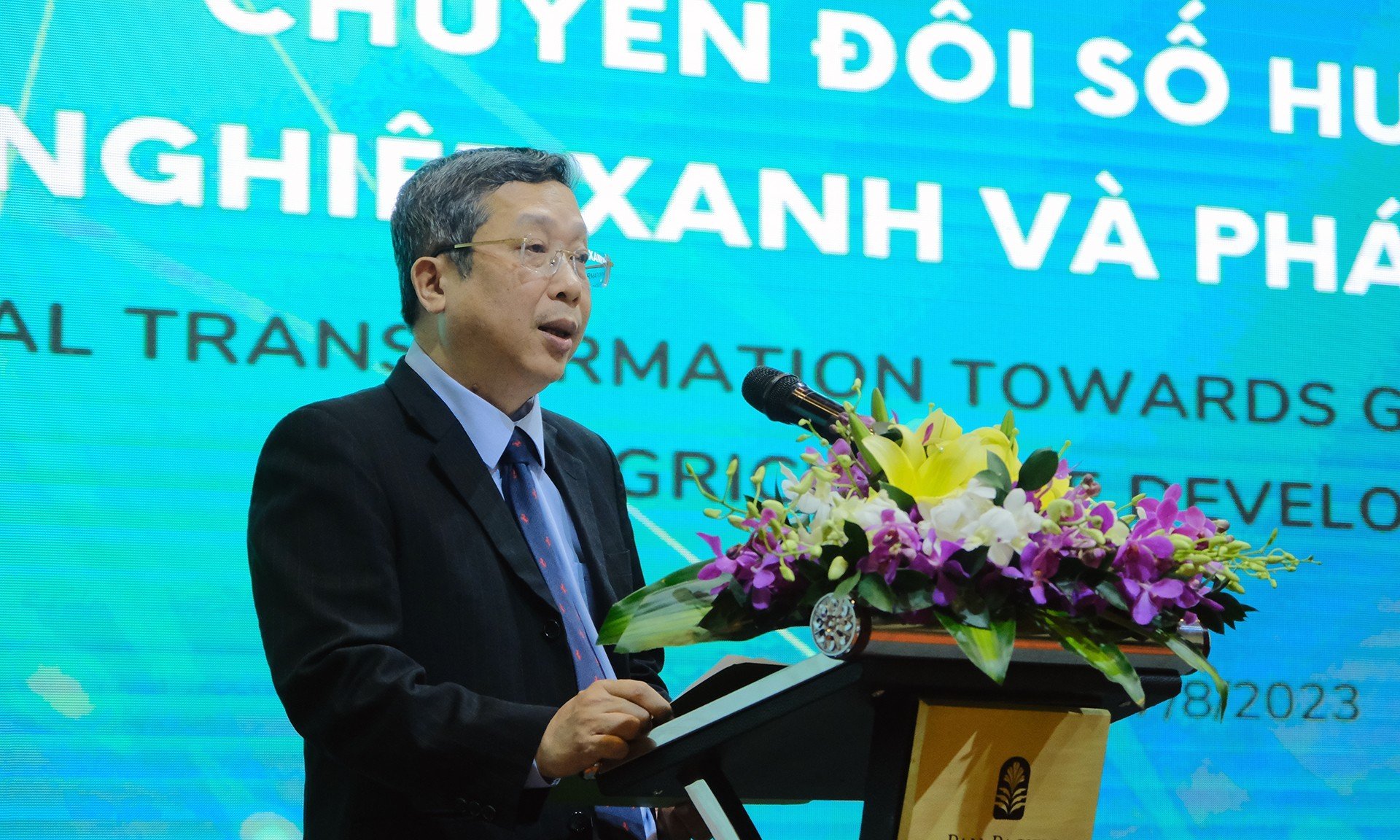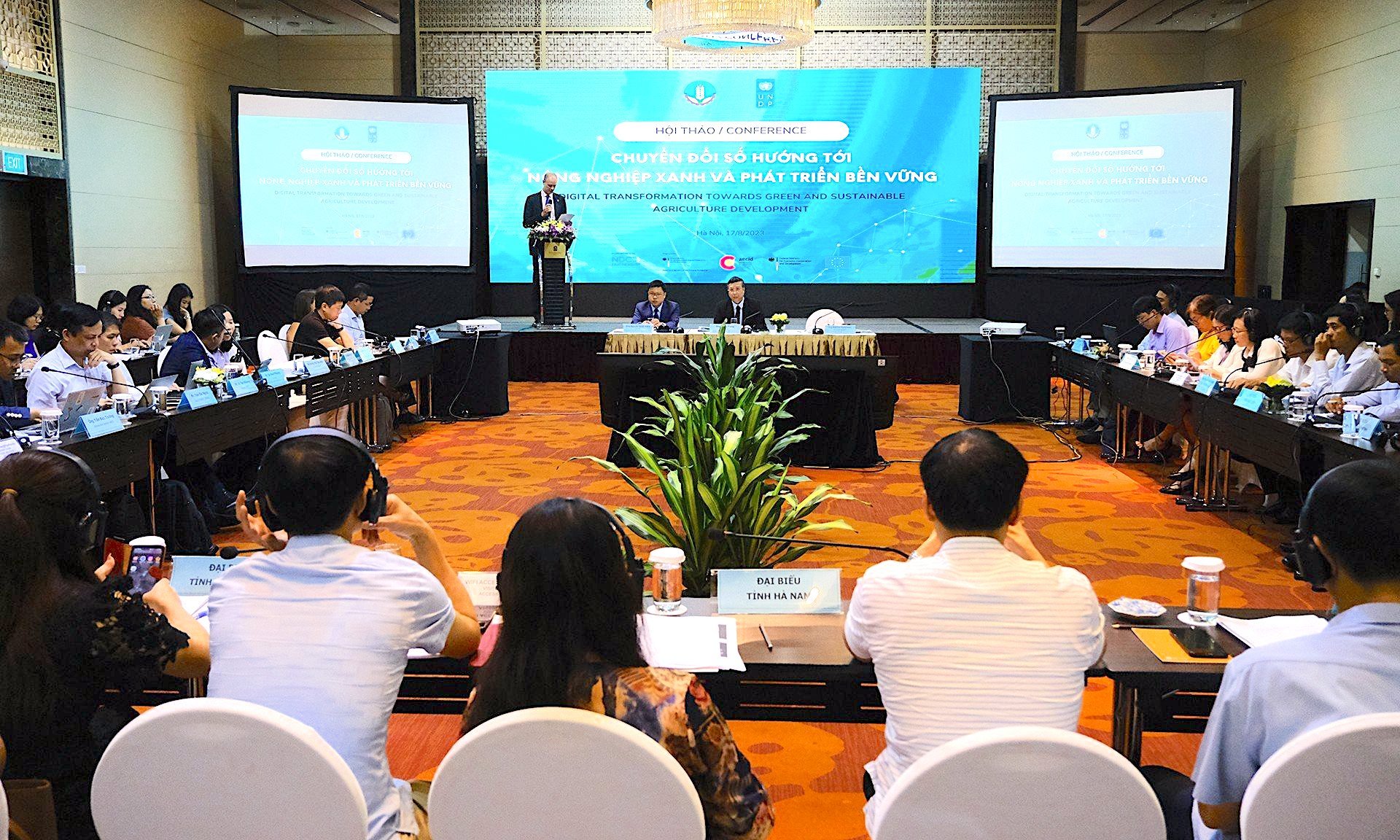May 21, 2025 | 07:48 GMT +7
May 21, 2025 | 07:48 GMT +7
Hotline: 0913.378.918
May 21, 2025 | 07:48 GMT +7
Hotline: 0913.378.918

Deputy Minister of the Ministry of Agriculture and Rural Development, Mr. Hoang Trung, delivered a speech at the conference "Digital Transformation towards Green and Sustainable Agriculture Development". Photo: Bao Thang.
On the morning of August 17th, the Ministry of Agriculture and Rural Development in collaboration with the United Nations Development Programme (UNDP) organized the conference "Digital Transformation towards Green and Sustainable Agriculture Development".
The event was held within the framework of the project "Promoting Private Investment in Low-Carbon and Climate-Resilient Agriculture to Implement Vietnam's NDC," aiming to promote innovative solutions in digital technology within the agricultural sector and rural development. This initiative also seeks to support the implementation of Vietnam's Nationally Determined Contributions (NDC) related to agriculture.
In Vietnam, the digital infrastructure in rural areas still requires improvement. The scale of digital transformation applications needs to be expanded and synchronized across regions and localities. The awareness and skills of farmers in using smart devices are limited, and small-scale farming areas are prevalent. Agricultural enterprises have yet to boldly invest in digital transformation. Therefore, the digital transformation of the agricultural sector and rural development requires the participation of central and local government agencies, as well as enterprises.
Deputy Minister of the Ministry of Agriculture and Rural Development, Mr. Hoang Trung, emphasized that "digital transformation in agriculture and rural development is an objective requirement and the responsibility, obligation, and rights of the entire system, industry, enterprises, scientific and technological community, especially farmers. Digital transformation is an important method to help farmers and agricultural producers achieve high-quality products with the lowest cost but the highest profit".
He also mentioned that the Ministry has established the Digital Transformation and Agricultural Statistics Center, a specialized unit responsible for information technology, digital transformation, and information security within the Ministry of Agriculture and Rural Development. This center serves as an advisory body to assist the Minister in coordinating the implementation of activities related to the application of information technology, digital transformation, and the development of an electronic government within the Ministry and the agriculture and rural development sector.
"We are proud to collaborate with the Ministry of Agriculture and Rural Development in investing in innovative solutions to support the green and sustainable transformation of the agricultural sector. We are delighted that the electronic carbon footprint tracing system has been established for Vietnam's key export items, dragon fruit and shrimp.
This tool is essential for local authorities, businesses, producers, and consumers to operate within a green economy, where adherence to 'green' standards and criteria is required as a new trend. By using technology to promote climate-smart business activities that align with the climate and enhance the sustainable livelihoods of local farmers, we are jointly paving the way for a greener and more prosperous future for Vietnam's agriculture", shared Patrick Haverman, Deputy Resident Representative of UNDP in Vietnam.

Mr. Patrick Haverman, Deputy Resident Representative of UNDP in Vietnam, believes that the use of technology can help promote smart business activities that are climate-friendly and contribute to the sustainable livelihoods of local farmers. Photo: Bao Thang.
The project "Promoting Private Sector Investment in Low-Carbon Agriculture and Climate Change Response, contributing to Vietnam's NDC" (Agricultural NDC) is jointly implemented by the Ministry of Agriculture and Rural Development and UNDP in collaboration with Binh Thuan and Bac Lieu provinces from 2019 to 2023. With financial support from the Governments of Germany, Spain, and the European Union, the project aims to encourage active involvement of the private sector in funding, supporting, and implementing technically feasible and financially viable measures for mitigation and adaptation, with risk alerts, to support Vietnam's NDC targets in agriculture.
At the conference, UNDP and the Ministry of Agriculture and Rural Development introduced for the first time a model of an electronic traceability system to track the origin and "carbon footprint" of each dragon fruit produced in Binh Thuan.
With this system, domestic and international consumers buying or importing dragon fruits from the key production area of Binh Thuan, Vietnam, can now scan QR codes to trace the origin of the fruit and the level of "green" or environmentally friendly practices applied to its production in the most transparent manner.
In the context of the green transition in agriculture, this is an important tool for local producers and businesses in Vietnam to monitor and manage the greenhouse gas emissions of the supply chain and avoid unnecessary barriers when exporting to high-value markets, often in places moving towards cross-border carbon adjustment mechanisms.
Furthermore, many experts contributed their insights to the conference, discussing topics related to the strategic vision of digital transformation in agriculture and rural development, leveraging digital platforms to monitor and track "carbon footprints" in key export sectors, promoting low-carbon emissions and environmentally friendly supply chains for products such as dragon fruit and shrimp;
The deployment of digital systems to enhance rice production management, establish agricultural and rural development data architecture, and strengthen coordination between local and central units in the digital revolution are emphasized in protecting green and sustainable agricultural activities.
Among these, several smart agriculture models linked to digital transformation that align with sustainable agricultural and rural development strategies were highlighted.
To ensure the synchronized and smooth implementation of the digital transformation mission, Deputy Minister Hoang Trung suggested several solutions and directions at the workshop.
Firstly, raising awareness among localities, businesses, and especially farmers about the role and importance of digital technology application in production and business in the agricultural sector.
Secondly, upgrading and moving towards building modern and cost-competitive digital infrastructure.
Thirdly, accelerating the establishment of agricultural data systems, particularly data related to land, crops, livestock, cultivation areas, farmers, the quantity of agricultural products and services, digitizing operational documents of the Ministry; constructing and standardizing sectoral databases, creating a synchronized digital agriculture map based on large-scale data to connect, share, and provide open data; developing software for managing, monitoring, evaluating, and classifying agricultural products; building databases for land, environment, weather, and providing them to citizens and businesses. Additionally, encouraging citizens and businesses to digitize production processes and move towards integrating and making products transparent through QR code scanning systems.
Fourthly, enhancing the level and accessibility of digital technology in agricultural production for farmers.
Fifthly, formulating and refining policies that serve the digital transformation in agriculture in a suitable and timely manner, creating incentives to promote effective and focused digital transformation in the agricultural sector.
Translated by Nguyen Hai Long

(VAN) Japan's grant aid project contributes to capacity building, promoting organic agricultural production, and fostering sustainable community development in Dong Thap province.

(VAN) For years, the CRISPR-Cas9 genome technology has been reshaping genetic engineering, a precision tool to transform everything from agriculture to medicine.

(VAN) Vietnam aims to become a 'leader' in the region in the capacity and managing effectively soil health and crop nutrition.
![Reducing emissions from rice fields: [Part 1] Farming clean rice together](https://t.ex-cdn.com/nongnghiepmoitruong.vn/608w/files/news/2025/05/05/z6509661417740_a647202949c539012a959e841c03e1d3-nongnghiep-143611.jpg)
(VAN) Growing clean rice helps reduce environmental pollution while increasing income, allowing farmers to feel secure in production and remain committed to their fields for the long term.
/2025/05/19/5136-1-144800_230.jpg)
(VAN) The Nghe An Provincial People's Committee has just approved the list of beneficiaries eligible for revenue from the Emission Reductions Payment Agreement (ERPA) in the North Central region for the year 2025.

(VAN) 14 out of 35 domesticated elephants in Dak Lak province have had their living conditions improved, with 11 of them currently participating in the non-riding elephant tourism model.

(VAN) Muong Nhe Nature Reserve hopes that being upgraded to a national park will lay the foundation for forest protection efforts to be carried out in a systematic, modern, and sustainable manner.